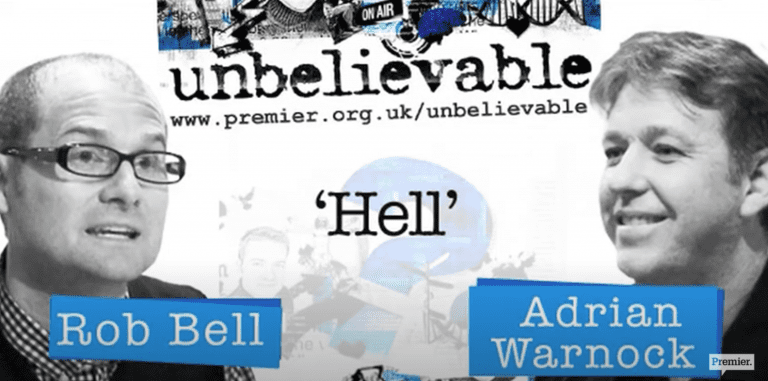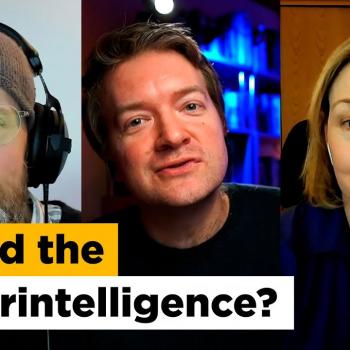
Hell is a topic which confuses, upsets and terrifies many believers. It is also the reason many non-Christians struggle to believe – how could a loving God send people to such an awful place? Erik Strandness unpacks some of Rob Bell’s theology on this topic and shares his own thoughts.
In a classic rebroadcast episode of Unbelievable? Rob Bell and Adrian Warnock faced off to discuss the implications of the ideas expressed in Bell’s best-selling book Love Wins. In a day and age where most of what counts as cultural dialogue consists of angry and judgmental barbs from both the secular and religious camps it was refreshing to hear a show that sought to explore God’s love.
While I disagree with many of Bell’s ideas, he certainly raised important questions that every Christian should contemplate. As with most of the guests on Unbelievable? who have issues with the current state of Christianity, Bell’s book was largely a reaction to a legalistic, fundamentalist evangelical understanding of heaven and hell.
Universalist?
Bell seemed very reluctant to label himself a universalist, but even his subtitle, A Book About Heaven, Hell, and the Fate of Every Person Who Ever Lived, seems to suggest he has a pretty good idea of where we are all headed and that destination has no need for fire extinguishers.
Love Wins is a fascinating book because Bell still finds hell a useful term as it describes all the pain and suffering that results when we don’t follow God’s plan on earth. However, he gets a bit queasy when that language spills over into eternity. The real issue for Bell isn’t hell’s existence but its location, duration and immutability.
Both Adrian Warnock and Unbelievable? host, Justin Brierley, pushed Bell to clarify his views but were usually met with vagaries and evasive ripostes. I suspect that at the time of the debate in 2011 he was still trying to retain some evangelical street cred and had not yet joined the Oprah Winfrey travelling salvation show.
Hell on Earth
Bell summarized hell like this in Love Wins:
“To summarize, then, we need a loaded, volatile, adequately violent, dramatic, serious word to describe the very real consequences we experience when we reject the good and true and beautiful life that God has for us. We need a word that refers to the big, wide, terrible evil that comes from the secrets hidden deep within our hearts all the way to the massive, society-wide collapse and chaos that comes when we fail to live in God’s world God’s way. And for that, the word ‘hell’ works quite well.”
Bell, however, wanted to limit it to hell-on-earth and was very uncomfortable with the idea that it could extend into the afterlife. The problem is that by limiting hell to earthly consequences he effectively reduces the gospel to a guide for better living rather than cherishing it as a treasure map to a heavenly Kingdom. Sadly, his view makes the work of a Savior interchangeable with the advice of a personal life coach. And death, even death on a cross, seems a steep price to pay for offering sage advice.
It’s fascinating that talk of hell becomes so prominent in the New Testament. It was Jesus’ death and resurrection that made it once again possible for humans to dwell with God, so if one defines hell as separation from God, then it appears that our eternal destiny hinges on whether or not we accept what Jesus did on our behalf. God makes universalism possible because the “no greater love” that Jesus offered was sufficient to save the entire world. But since love is a relationship, only those who accept it and offer it back can avail themselves of its salvific power.
The Dance of Love
I agree with Bell that love does win, but his conception of love is incomplete because he forgets that it takes two-to-tango. God has extended a dance invitation to all of us so when we tell Him that our dance card is full we miss the opportunity to trip the light fantastic with the lover of our souls. Sadly, many humans are afraid of the commitments inherent in divine intimacy so they opt for being wallflowers at the salvation dance rather than stepping out and cutting a rug with the Groom at the wedding feast of the Lamb.
God’s love wins! However, when it is not reciprocated, those who reject it lose. Hell isn’t about sins committed but about God’s redemptive love going unrequited.
“You may go to hell unsaved but you won’t go unloved.” (Jack Graham)
Puppy Love
I think many progressive Christians and New Spiritualists confuse divine intimacy with puppy love. The problem is that sooner or later the peeing exuberance of puppy love must be potty trained and transformed into the mature love of man’s Best Friend.
“Hell isn’t about sins committed but about God’s redemptive love going unrequited”
We need to get over this idea that love is a feeling, a high, butterflies in the stomach, because they all fade over time. The good news is that once they do, it will be replaced by an even deeper love fuelled by life-long commitment, for better or worse, and richer or poorer.
Postmodern Love
Postmodernism has redefined love as tolerance, which allows one to feel ‘love’ without the hard work of commitment. Tolerance is promoted as the ultimate antidote for enmity but in the end is nothing but a balm of indifference.
The cure for hate is not greater tolerance but “no greater love”. God did everything possible to love us and all we have to do is accept it. He offered unconditional love while we were still sinners, but that love is meaningless unless we acknowledge the profundity of the proposal and give out a hearty, “I do!”
Metrics of Love
How do we measure true love? Is it by the size of the flower bouquet or the number of boxes of chocolates? Is it by the number of candlelight dinners or amount of sex? Or is true love measured by surrendering a career to care for a loved one dying of cancer? Selling home and possessions to meet the expenses of providing for a child with additional needs? We all know the answer to these questions but we distract ourselves from meaningful, sacrificial love by redefining it as tolerance and then pat ourselves on the back even though we never lifted a finger to help. We let our fellow humans do whatever they want and end up confusing our ability to “look the other way” with unconditional love. The only real, surefire test of love is the willingness to die for another.
Love is dangerous because it contains within it the possibility of hurt. Tolerance, on the other hand, is perfectly safe because it lacks “dangers and perturbations”. Tolerance promotes hell while love promotes heaven.
C.S. Lewis eloquently described the risks and rewards of true love:
“To love at all is to be vulnerable. Love anything, and your heart will certainly be wrung and possibly broken. If you want to make sure of keeping it intact, you must give your heart to no one, not even to an animal. Wrap it carefully round with hobbies and little luxuries; avoid all entanglements; lock it up safe in the casket or coffin of your selfishness. But in that casket – safe, dark, motionless, airless – it will change. It will not be broken; it will become unbreakable, impenetrable, and irredeemable…The only place outside Heaven where you can be perfectly safe from all the dangers and perturbations of love is hell. C.S. Lewis – The Four Loves
Love is a risk that contains within it the possibility of heaven or hell so we had best take God’s offer of “no greater love” very seriously indeed.
How do you Mend a Broken Heart?
If humanity’s original sin had merely been a broken rule, some sort of restitution would seem adequate, but restoring a broken, committed relationship requires some serious work. God had become the jilted lover, the betrayed spouse and His heart grieved. We became the unfaithful spouse and adulterous partner who continued to prostitute ourselves. The only thing God was powerless to do was to make us say “I do,” because God wanted an intimate, chosen relationship and not a shotgun wedding.
So how does an unfaithful spouse make amends to a partner and reestablish trust when such an enormous wall of anger, resentment and suspicion has been built up? He or she could begin with gifts and acts of service. A good start perhaps, but in the end, these are merely external acts that may or may not signal a change of heart. What the offended partner really needs is assurance of internal change, a transformed heart. Then and only then will it be possible to restore the relationship.
“When God’s love is reciprocated the door to heaven is opened wide, but when His love goes unrequited, hell awaits”
How could God restore a relationship when the other party was unwilling to make any effort at all? God infused a dose of the greatest love of all, the laying down of one’s life for another, to make things right. A restored relationship was once again possible but required one more thing – acquiescence.
Informed Consent
I’m more sympathetic to David Bentley Hart’s argument that it is unfair to expect mere mortals to make decisions about immortal destinations. If we can only see through a glass darkly, then how can we be expected to make an earthly decision about an eternal destiny?
Whether we are totally depraved, usually bad or occasionally naughty we seem to lack the ability to comprehend eternity, yet eternity was placed in our hearts. How can mortal beings understand immortality? How are we -expected to get directions to the infinite with a finite road map?
Since salvation is a mystery, it would seem to me that we should be offered some grace because of our human limitations this side of the grave. I think that part of the problem is that we haven’t framed the salvation question correctly. God isn’t asking us if we want to go to heaven or hell, he is asking us if we love Him or not. So the question is not whether we can comprehend eternal perdition but rather divine passion.
The question then becomes can humans comprehend love enough to respond to Jesus’ sacrifice on our behalf? Do we have sufficient understanding of “no greater love” to make decisions about our postmortem destiny?
“This is My commandment, that you love one another, just as I have loved you. Greater love has no one than this, that one lay down his life for his friends. You are My friends if you do what I command you. No longer do I call you slaves, for the slave does not know what his master is doing; but I have called you friends, for all things that I have heard from My Father I have made known to you.” (John 15:12-15)
I don’t know the answer to that question, but I find it fascinating that one of the most common characteristics of near-death experiences is the sensation of profound, indescribable love by both Christians and non-Christians. Maybe it is right after we die that God makes His love most fully known to us, a point at which there will be no unfairness because we will have been given all the information necessary for a fully informed decision.
I appreciated what Warnock said on the show about being unsure as to who was going to hell but at least having a pretty good idea of who was going to heaven. The road to heaven seems fairly well marked but the highway to hell seems a bit dodgy. I think we need to be careful when we make Christianity more about avoiding hell than acquiring heaven. Our faith shouldn’t be out of fear for what we didn’t do but gratitude for what He has done. Our Kingdom citizenship papers aren’t granted because we passed a naturalization exam but because they were stamped with blood of the Lamb.
Lover of Our Souls
When Adam and Eve chose to become like God they violated the relationship parameters God had established from the beginning. The first couple initiated the breakup with God and we, as their offspring, continue the separation by brazenly posting we are “available” on our Facebook pages. We have the nerve to woo other lovers in front of His face, rubbing God’s nose in the excrement of our idolatrous promiscuity. Astonishingly, God wants us back and will go to any length to be reunited with us. He can bring us to the altar, but it is we who must utter “I do.”
Sin is a broken relationship with the Lover of our soul, so perhaps we would take it a bit more seriously if we accepted the fact that we have grieved the heart of the only One who ever unconditionally loved us. How can we choose to be eternally entertained in the strip club of idolatry when our true Spouse waits patiently at home for our return?
It is remarkable that a God who needs nothing from us, and to Whom we are incapable of giving anything, patiently takes all the grief we can throw His way and still doggedly pursues us. Jesus stands on our doorstep, arms outstretched, offering “no greater love”. What will we do? Run to the altar of faith with tears of joy and renew our vows, or head back to the red-light district of our original sin in search of an encounter with an idol of ill-repute?
In the end, when God’s love is reciprocated the door to heaven is opened wide, but when His love goes unrequited, hell awaits.
Listen to more from Rob Bell and Adrian Warnock on hell
Subscribe to the Unbelievable? podcast












